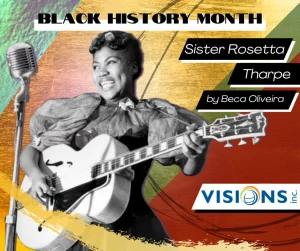Rock ‘n’ Roll Was Invented by a Queer Black Woman by Beca Oliveira

This Black History Month, the VISIONS community is sharing the stories of Black historical figures who have impacted and inspired us personally.
Rock ‘n’ Roll Was Invented by a Queer Black Woman by Beca Oliveira
She was Elvis before Elvis, she was Aretha before Aretha, she was Jimi before Jimi. She was the queer Black woman who literally invented rock ’n’ roll: Sister Rosetta Tharpe. She gave Little Richard his first gig outside the church. She opened the doors for Chuck Berry and Buddy Holly, and before the 1990s, almost no one into rock ’n’ roll had heard her name.
White men were making big money and big news in rock ’n’ roll; admitting the entire genre rests squarely on the shoulders of a woman, Black AND queer at that, was a little too much for European-descended folks in the 1900s.
To quote Rolling Stone, on the announcement on her induction to the Hall of Fame in 2018:
“A queer black woman from Arkansas who shredded on electric guitar, belted praises both to God and secular pleasures, and broke the color line touring with white singers, she was gospel’s first superstar, and she most assuredly rocked.”
Born Rosetta Nubin to Katie Bell Nubin and Willis Atkins, Arkansas cotton pickers, in 1915, Rosetta started learning music at age 4. By age 6, she was touring, along with her mother, as a regular performer in a traveling evangelical troupe. Married and divorced (with a new stage name) by 23, Sister Rosetta Tharpe recorded for the first time: four Gospel tracks for Decca Records, the label’s first Gospel recordings. All four were wildly successful.
She kept working, touring, recording: during World War II, she was a frequent performer at the Apollo theater, where folks said she could “play guitar like a man.” By 1944, “Strange Things Happening Every Day,” recorded with Sammy Price, Decca’s house boogie woogie pianist, showcased her incredible gift as a guitarist as well as her electric delivery. This recording is generally accepted as the first rock ‘n’ roll record.
She toured (and had a relationship) with Marie Knight for years. In 1950, the duo and partnership broke up, and one year later, Sister Rosetta married Russell Morrison, her manager, in a baseball stadium concert wedding that would have JLo envious now. Twenty-five thousand people attended.
In the late 50s and early 60s, as young white men benefited from the road she had built in the U.S., Sister Rosetta went to Europe to perform. Her most famous recorded performance was in 1964, in a train station in Manchester. She arrived by horse drawn carriage, wearing a coat perfect for Sunday Service, and as soon as she slung her guitar strap over her shoulder, every inch of her is electric.
“When people would ask her about her music,” biographer Gayle Wald said in a 2019 AfroPunk interview, “she would say, ‘Oh, these kids and rock and roll — this is just sped up rhythm and blues. I’ve been doing that forever.’”
Sister Rosetta Tharpe died from a stroke in Philadelphia in 1973, and was buried without a headstone for 30 years. She wasn’t inducted into the Rock & Roll Hall of Fame until 2018, a full 45 years after her death, and 32 years after the Hall of Fame inducted Little Richie.
Without Sister Rosetta, the world would not know Bob Dylan, Chuck Berry, Little Nas X, nor Polly Styrene. The world would not have the gift of a guitar gently weeping, would not know the thrill of killer licks: because Sister Rosetta Tharpe was the one who took gospel out of Southern Churches, and played it on electric guitars in nightclubs.
Amen!
